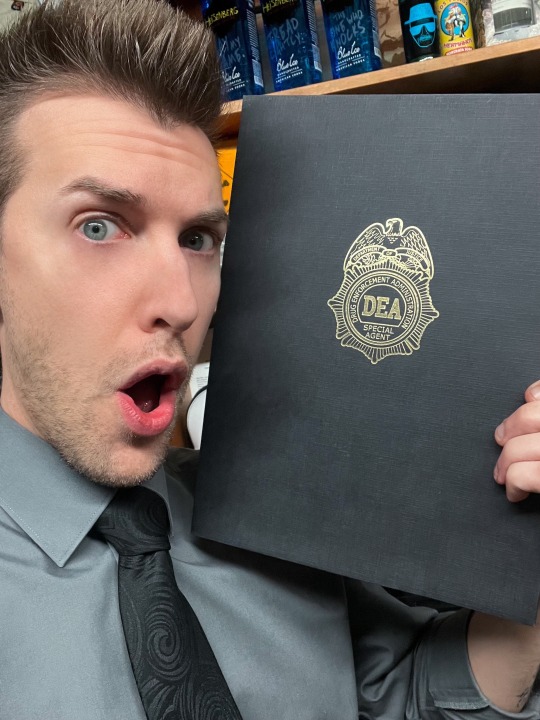#drug enforcement administration
Text
#dea#drug enforcement administration#cannabis#marijuana#weed#pot#legalization#medical marijuana#mmj#medical cannabis#legalize
7 notes
·
View notes
Text
Fuck it, I'm using this platform. This is both important and severely urgent. It's technically not even totally unrelated to the Faire: loads of Faire actors have adhd, being that adhd-thinking gives one a natural advantage in improv.
Tldr, which I'm putting at the top: you have a chance to help people with adhd whose lives have been upended as a result of lack of access to their medication.
For those who don't know, there has been a shortage of Adderall and Adderall equivalents for at least a year-and-a-half now. This is basically because stimulant medication is a controlled substance, so the Drug Enforcement Administration (DEA) imposes a limit on the amount that can be legally manufactured in the u.s. within the span of a year. The percentage of people with adhd has not increased; however, between the pandemic upending everybody's routines and coping mechanisms, increased visibility and understanding of adhd, and gradual erosion of stereotypes and stigma of the same, more of us are FINALLY actually getting diagnosed. More diagnoses means more treatment plans, which, in turn, means more prescription of Adderall and Adderall equivalents, and other stimulant medications, to the point that prescription amounts surpass the yearly cap.
This has, to put it bluntly, been absolute hell for the millions of people of all ages who literally need this medication to function. Our careers, grades, relationships, and more have been gutted, and so many of us have been reduced to a shadow of ourselves, exhausted and scrambling, never making headway. Individuals have suffered, families have suffered, and society has suffered.
The good news: the DEA is finally taking public comments on the matter of this low limitation. The bad news: comments must be submitted by 11:59pm EST on Monday December 4th – literally today.
For the sake of all Faire actors whose natural A-to-C thinking patterns have granted you laughter and joy, as well as tons of your fellow PARF enjoyers, PLEASE go tell the DEA to raise the cap.
Here's the link to the proposed aggregate production quota document.
Here's the link to the search results for "Docket No. DEA–1228P" on regulations-dot-gov.
Here's a link directly to the comment form.
For more information on how stimulant medication helps people with adhd, I recommend this ten-minute video from the esteemed How To ADHD youtube channel.
For more information on adhd in general, here is a playlist of definitions and explanations of common adhd terms.
A playlist of more expanded videos about what adhd is.
A playlist of fundamentals of how to exist with adhd.
And a final note: there are more steps to submitting a comment than just the comment itself, so be sure to leave a little extra time.
#not strictly parf#adhd#how to adhd#adderall shortage#please help us for the love of all that's good#drug enforcement administration adderall cap#dea adderall cap#adderall cap#drug enforcement administration#dea
7 notes
·
View notes
Text
The Biden administration’s Department of Health and Human Services is recommending that the Drug Enforcement Administration significantly loosen federal restrictions on marijuana but stopped short of advising that it should be entirely removed from the Controlled Substances Act.
The health agency wants the drug moved from Schedule I to Schedule III under the CSA, potentially the biggest change in federal drug policy in decades.
HHS Assistant Secretary of Health Rachel Levine wrote in a Tuesday letter to the DEA, first reported by Bloomberg News, that the recommendation was based on a review conducted by the Food and Drug Administration.
The DEA confirmed to POLITICO that it received the letter.
“As part of this process, HHS conducted a scientific and medical evaluation for consideration by DEA. DEA has the final authority to schedule or reschedule a drug under the Controlled Substances Act,” a spokesperson for the agency said in a statement. “DEA will now initiate its review.”
The HHS letter is part of the official review process initiated by President Joe Biden last October: The FDA conducts the review, which is then sent to the National Institute on Drug Abuse and HHS, after which HHS transmits a letter of recommendation to the DEA. The DEA is not required to follow HHS’s recommendation.
The White House on Wednesday refused to comment on the review process.
“The administration process is an independent process led by HHS, led by the Department of Justice, and guided by evidence,” White House Press Secretary Karine Jean-Pierre told reporters. “We’re just not going to comment on that.”
Cannabis is currently a Schedule I substance on the CSA, which means it is deemed to have a high likelihood of abuse and no medical uses. Heroin and LSD are also Schedule I drugs. Schedule III drugs are categorized as having “moderate to low potential for physical and psychological dependence.” The category includes ketamine and testosterone.
The HHS recommendation is the result of a nearly yearlong federal review of all available marijuana research. Biden’s executive action — which also included federal pardons for low-level marijuana convictions — was seen by many as a political move taken ahead of the midterm elections to incentivize turnout among younger and more progressive voters.
At the time, advocates and some lawmakers urged Biden to take clear steps to remove cannabis completely from the CSA — versus rescheduling it. Legalization advocates on Wednesday reiterated that rescheduling would not solve many of the problem they’ve been asking the Biden administration to correct.
“Rescheduling cannabis from 1 to 3 does not end criminalization, it just rebrands it. People will still be subject to criminal penalties for mere possession, regardless of their legal status in a state-level medical program,” cannabis advocate Justin Strekal told POLITICO on Wednesday.
FEDERAL-STATE CONFLICT
Federal law has failed to keep up with massive changes over the last decade in state cannabis policies. 23 states now allow anyone at least 21 years old to legally posses the drug, while 38 states have established medical marijuana programs.
But because cannabis businesses are not federally legal, they are subject to a federal tax code that prohibits narcotics traffickers from taking typical tax exemptions for business expenses like salaries and benefits. That code does not apply to Schedule III, so if the DEA approved HHS’ recommendation, cannabis businesses around the country would immediately be paying much less in federal taxes.
That would provide a big boost to the financially struggling industry.
“It’s giant,” said Charlie Bachtell, CEO of Cresco Labs, one of the country’s largest cannabis companies, in an interview. “I think you would see a healthier cannabis industry a year from now.”
Rescheduling could also mean legislative changes on Capitol Hill, where a bill to make it easier for banks to offer financial services to the cannabis industry — backed by Senate Majority Leader Chuck Schumer (D-N.Y.) and Sens. Steve Daines (R-Mont.) and Jeff Merkley (D-Ore.) — has been slowly plodding toward the finish line.
Changing marijuana’s federal classification would almost certainly make it easier for cannabis businesses to access banking services and raise cash even without any legislative changes.
“I don’t see a need for the SAFE Banking Act if this in fact becomes the official position,” said Jonathan Havens, a cannabis attorney at Saul Ewing who previously worked for the FDA. “I’m not saying that all banks will want to jump into this space, but the need for safe harbors I don’t think exists like it does today.”
Schumer on Wednesday urged the DEA to “quickly follow through on this important step” but added he is “continuing to work in Congress to pass important marijuana legislation and criminal justice reform.”
The shift in federal cannabis policy would also make it easier to conduct research on the health effects of cannabis consumption and for pharmaceutical companies to bring cannabis-based drugs to market. Researchers have long chafed at restrictions that only allow them to procure cannabis from a single farm at the University of Mississippi that bears little resemblance to the high-potency products many consumers are purchasing in state-legal markets.
But if the FDA decides to fully enforce regulations on the cannabis industry as it does all other Schedule III drugs, that could mean major changes for state markets.
“The question that I have is whether or not the current industry will eventually be replaced by the pharmaceutical industry,” said Rachel Gillette, head of the cannabis practice at Holland & Hart, noting that ketamine and anabolic steroids are also Schedule III drugs. “I can’t go down to the corner store and buy those things.”
Some state regulators, however, don’t think that much will change.
“This adjusts the type of security and type of bureaucracy that exists around federal research into the substance [and] it would make it easier for companies to bring cannabis based pharmaceuticals into market,” said John Hudak, Director of Maine’s Office of Cannabis Policy, in an interview. “But in terms of administration of a state program, it has very little impact.”
MIXED RESPONSE
The cannabis industry on Wednesday was ebullient, while drug legalization advocates and some lawmakers had a more tepid — or downright condemnatory — response to the news.
“We believe that rescheduling to Schedule III will mark the most significant federal cannabis reform in modern history,” said Edward Conklin, executive director of the US Cannabis Council, an advocacy and trade group, in a statement. “President Biden is effectively declaring an end to Nixon’s failed war on cannabis and placing the nation on a trajectory to end prohibition.”
While the industry would see immediate financial benefits from a loosening of federal restrictions, however, criminal penalties on cannabis would not change dramatically. That prompted some advocates to criticize the HHS recommendation.
“This shift would fall woefully short of the promises made by President Biden during his 2020 presidential election campaign, especially promises made to Black and Brown communities,” said Cat Packer, director of drug markets and regulation at the Drug Policy Alliance, which advocates legalizing all drugs.
Anti-legalization advocates, meanwhile, blasted the move as potentially detrimental to public health.
“The addiction profiteers who have been exposed for lying about marijuana’s physical, mental and economic impacts, are desperately looking for legitimacy in the wake of mounting evidence their products are harming millions of Americans,” said Kevin Sabet, president of Smart Approaches to Marijuana, in a statement. “It is regrettable that the Department of Health and Human Services move now appears to be a nod to those monied interests.”
#us politics#news#politico#2023#biden administration#department of health and human services#Drug Enforcement Administration#Controlled Substances Act#marijuana#cannabis#Rachel Levine#National Institute on Drug Abuse#Department of Justice#schedule i drugs#schedule iii drugs#ketamine#testosterone#anabolic steroids#sen. Chuck Schumer#sen. Steve Daines#sen. Jeff Merkley#SAFE Banking Act#federal taxes#decriminalization#decriminalize drugs#war on drugs
10 notes
·
View notes
Text
I had the GREATEST Time in High School, College and University as a Teenager during Our United States Republican Florida Governor Jeb Bush’s Tenure during Bush-Cheney Eras! 🍟💵❤️🇺🇸☀️🌈🥞🍊🍋🍑🍉🍌 “Mangoes…” says George W Bush! I miss the Scents of Peaches and Mangos in my Family Home! Since Obama Era, I can’t find Peach Scents in Home Depot anymore… We must Bring Back Peach Scents for Happy, Family Memories! Cut Taxes so we All have many more Festivities and Fiestas! 🍣🍱🍰🍿🍪🍫 US Gay Men and Our Fellow Lesbians benefited SOOO MUCH from the Republican Tax Cuts from President George W Bush and Governor Jeb Bush that Our Celebrations and Gay Parades were filled with LIGHT — but now Lady Gaga’s, Lady Antebellum’s, and Rihanna’s Dark Gloomy Gravity Music have brought down Movies with Netflix’s Black and Bloody Red Logo and more terror. CUT THE TAXES!
#miami herald#oprah winfrey#the oprah conversation#republicans#washington post#new york post#new york times#abc news#abc7eyewitness#abcnews#drug enforcement administration#fbi#fbi investigation#fbi most wanted#hrc#human rights campaign#human rights commission#jk rowling#oprah interview#oprahsbookclub#wplg local 10#wplglocal10#president george w. bush#president donald trump#president bush#president trump
10 notes
·
View notes
Text
Yakima police arrested man they believe was running a drug house
Yakima police arrested man they believe was running a drug house
Yakima police arrested man they believe was running a drug house – Yakima police have arrested a Yakima man aged 43 who they claim was a nuisance in the neighborhood and selling drugs from his Garfield Avenue residence.
According to jail records, the man will appear in Yakima County Superior Court Monday to make a preliminary appearance after his Friday arrest for selling methamphetamine,…

View On WordPress
2 notes
·
View notes
Text
youtube
#youtube#news#drug policy reform#drug policy evaluation#international cooperation#drug policy advocacy#drug policy analysis#drug abuse prevention#drug policy research#global plan#drug policy#drug enforcement administration#synthetic drugs#United Nations#drug addiction#fight#revealed#secret#drug trafficking#law enforcement#drug control#drug war
0 notes
Text
Most Americans want legal pot. Here's why feds are taking so long to change old rules.
Marijuana remains in an odd legal limbo in the United States, and there’s one organization at the center of it: The Drug Enforcement Administration.
The DEA has for decades held that marijuana is among the most dangerous, highly addictive drugs and has no medical value, despite growing state laws, medical evidence and popular opinion to the contrary. The result: Pot is widely available in some…

View On WordPress
#Controlled Substances Act#DEA#Drug Enforcement Administration#marijuana legalization#recreational marijuana
0 notes
Text



Recently acquired this production-used DEA Folder straight from one of the set designers who worked on Breaking Bad! 📂
Who knows, it may have even landed on ASAC Schrader’s desk at some point! Too bad there were no incriminating documents on Gustavo Fring inside though…
#breaking bad#brba#tv#tv show#tv shows#tv series#collecting#collection#collectibles#collector#memorabilia#prop#props#dea#dean norris#hank schrader#asac schrader#folder#drug enforcement administration
0 notes
Text
OPINION | The use of sniffer dogs at train stations is a "cynical display of force by Victoria Police", writes @whatsdoinmedia. Not only are these operations ineffective and invasive, but they undermine the government's efforts to reduce drug-related harm.
#vicpol#vicgov#victoria#melbourne#australia#animal abuse#drug detection#drug enforcement administration#ausgov#politas#auspol#tasgov#taspol#fuck neoliberals#neoliberal capitalism#anthony albanese#albanese government#acab1312#acab#all cops are bastards#all cops are bad#class war#privacy#invasion of privacy#fuck the police#fuck the patriarchy#fuck the supreme court#allcops#political#police state
0 notes
Text
#dea#drug enforcement administration#john fetterman#elizabeth warren#cannabis#marijuana#weed#pot#legalization#medical marijuana#mmj#medical cannabis#legalize#scheduling#schedule i
4 notes
·
View notes
Text
youtube
#law enforcement#drug enforcement administration#enforced feminization#jca enforcers#drug enforcement agency#Youtube
0 notes
Text

FUCK YOU DEA IM MAKING LIVING ROOM HOOCH!!!
0 notes
Text
I predict that the Communist Chinese Empire will abruptly Stop lending to Our United States Socialist Government, possibly causing our Capital Markets like @mcdonalds McDonalds, @burgerking Burger Kings @wendys Wendy’s, @wholefoods Whole Foods Markets, Sweet Tomatoes, Walmarts, Wells Fargo Bank, and Bank of America to Collapse — unless Democrats give up taxing us and our businesses and Business Empires like Foods Stocks and Foods Companies and finally Corporatize Public Libraries, Museums, K-12 Schools, Colleges, Universities, Post Office, Social Security, Medicaid, Medicare, Foods Stamps, NASA, Militaries, and many other Government entities before we STARVE! Democrats cannot tax all of Our Foods and Foods Businesses to Success! It’s impossible to Succeed if Government Democrat voters keep voting to punish our delicate foods businesses with taxes, penalties and other fees! Learn Macroeconomics and Quantitative REASONING! Sociologists frequently ask, “What resolves war and famine?”, and the Answer really is Cutting Taxes for Our Foods, Medicines, Clothes, Apartments, Houses, and Medical Devices and Supplies and to lower Trade Taxes known as “Tariffs” so we can Trade Foods, Medicines, Medical Devices, Medical Supplies, Clothes, Music, Movies, Books, Pens, Pencils, Calculators, Computers, and More of the Good Stuffs to each other’s countries intercontinentally so we Trade Foods and not declare War!
#miami herald#oprah winfrey#the oprah conversation#republicans#washington post#new york post#new york times#abc news#abc7eyewitness#abcnews#drug enforcement administration#fbi#fbi investigation#fbi most wanted#hrc#human rights campaign#human rights commission#jk rowling#oprah interview#oprahsbookclub#president george w. bush#president bush#president donald trump#president trump#president barack obama#president bill clinton#president obama
3 notes
·
View notes
Text
Mox News: Video: Representative Steve Cohen Schools DEA Official at House Oversight Hearing
Kire Schneider on Google+
The New Democrat on Facebook
The New Democrat on Twitter
I agree with Representative Steve Cohen that marijuana prohibition is definitely a joke and overwhelmingly hurts ethnic and racial minorities compared with Anglos and Caucasians. It is a war on freedom to criminalize what people do to themselves, especially when we are talking about a drug that can’t kill you…

View On WordPress
#American Drug War#Drug Enforcement Administration#Drug War#Marijuana#Marijuana Prohibition#Representative Steve Cohen#United States Congress#United States House of Representatives
0 notes
Text
Guadalajara Cartel Leader Rafael Caro Quintero Captured By Mexican Army
Guadalajara Cartel Leader Rafael Caro Quintero Captured By Mexican Army
One of the most infamous drug cartel leaders in Mexican history, Rafael Caro Quintero, was arrested Friday by Mexican soldiers in Chihuahua state, according to Reuters. The 69-year-old founder and former leader of the Guadalajara cartel had been a top target of U.S. officials since his release from prison in 2013.
Quintero was the brains behind the torture and murder of U.S. Drug Enforcement…

View On WordPress
0 notes
Text
President Joe Biden turns the Medical Marijuana Research Bill into law, changing how American scientists can do research on marijuana.
As anticipated by Marijuana Moment last week, the White House announced on Friday that President Biden signed the Medical Marijuana and Cannabidiol Research Expansion Act, "which establishes a new registration process for conducting research on marijuana and for manufacturing marijuana products for research purposes and drug development."
The bipartisan bill was introduced in July, quickly passed in the House in the same month, and unanimously approved by the Senate in November.
Rep. Earl Blumenauer (Democrat), who sponsored the bill, released a joint press statement along with Cannabis Caucus Co-Chairs Barbara Lee (Democrat), Dave Joyce (Republican), and Brian Mast (Republican) stressing the importance of such achievement.
"For decades, the federal government has stood in the way of science and progress—peddling a misguided and discriminatory approach to cannabis. Today marks a monumental step in remedying our federal cannabis laws. The Medical Marijuana and Cannabidiol Research Expansion Act will make it easier to study the impacts and potential of cannabis," the statement reads.
Furthermore, the Representatives highlighted how fundamental is medical research on marijuana to understand the full medicinal potential of the plant to treat a wide array of medical conditions and pledged to work on ending the war on drugs through a series of upcoming proposals that will reshape the status of marijuana at the federal level.
The law significantly eases the lives of scientists who wish to study marijuana for medical purposes, as they had to follow strict regulations that could delay their research.
The new legislation removes federal restrictions in order to ease research from studying the plant and speeds up the application process to approve marijuana-related scientific studies.
Under the new law, the federal government has to ensure an adequate, uninterrupted supply of marijuana available to scientists for studies on medical marijuana.
Therefore, researchers will be able to learn more about the plant's medical properties and request large amounts of marijuana to use for research.
In fact, the legislation now requires that within 60 days of receiving a researcher's application, the U.S. Attorney General has to approve it, request more information, or deny it specifying the reasons. If researchers submit more information upon request, the Attorney General has 30 days to decide.
Universities and research institutions will now be able to acquire U.S. Drug Enforcement Administration (DEA) license to grow, manufacture, distribute, dispense and possess marijuana for research purposes, with guidance from the Department of Health and Human Services (HHS) and the U.S. Food And Drug Administration.
Scientists who wish to do marijuana research may update their protocol without informing the DEA if the quantity and form of marijuana, the source, and the storage conditions of the material won't change.
The legislation also encourages the FDA to develop marijuana-derived medicines and addresses the HHS to determine the potential medical benefits of marijuana or cannabidiol (or CBD) as a drug.
The Medical Marijuana and Cannabidiol Research Expansion Act also intervenes in the doctor-patient relationship by allowing physicians to discuss the currently known potential harms and benefits of marijuana cannabinoids, such as CBD, as a treatment or the known possible damages and benefits of marijuana and its compounds.
Nevertheless, the legislation doesn't allow scientists to obtain marijuana from state-run dispensaries and won't reschedule marijuana at the federal level.
In fact, marijuana will remain illegal at the federal level under Schedule I of the Controlled Substances Act.
However, the legislation represents a significant step forward for medical research on marijuana in the U.S.
Before the new law, doing research on marijuana was very difficult in the U.S. as scientists needed approval from multiple agencies to conduct studies, which could sometimes take years.
Furthermore, scientists were only allowed to use marijuana grown by the University of Mississippi, although the DEA has recently awarded six other marijuana cultivation licenses for research to U.S. companies.
Biden's signature of The Medical Marijuana and Cannabidiol Research Expansion Act follows the executive order in October pardoning about 6,500 individuals convicted for marijuana possession at the federal level.
On that occasion, he also asked the Secretary of the HHS and the Attorney General to "initiate the process of reviewing how marijuana is scheduled under federal law."
Although the new law doesn't implement more reform at the federal level, it may pave the way for new federal legislation on marijuana, such as the SAFE Banking Act, that may ease the federal restrictions on the marijuana industry.
#us politics#news#forbes#2022#president joe biden#biden administration#medical marijuanna#marijuana#cannabis#Medical Marijuana and Cannabidiol Research Expansion Act#Rep. Earl Blumenauer#rep. Barbara Lee#rep. Dave Joyce#rep. Brian Mast#Cannabis Caucus#Department of Health and Human Services#drug enforcement agency#Food And Drug Administration#cbd#Controlled Substances Act#schedule 1
17 notes
·
View notes